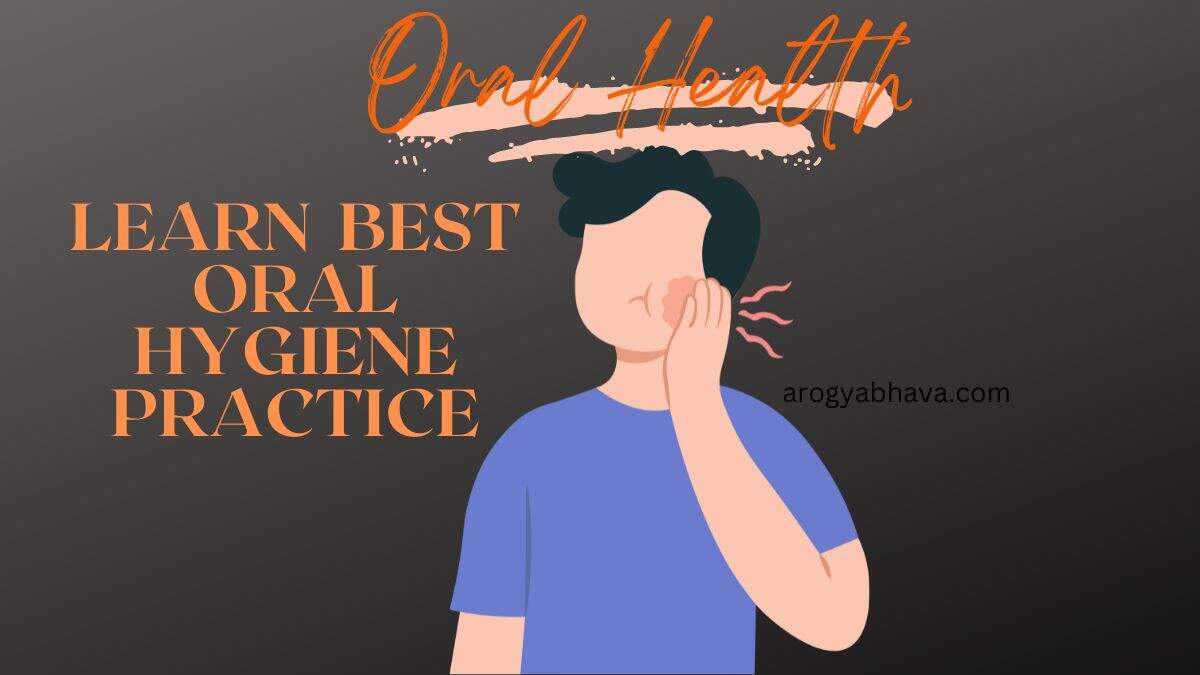Oral Health: Best Oral Hygiene Practice

Oral Health: By practising oral hygiene, you can prevent tooth decay and infections from spreading to other mouth structures. Flossing and Regular brushing are part of this. Doctors also strongly advise scheduling dental exams and cleanings at least two times a year to maintain good oral hygiene.
The general health and well-being of a person depend on oral hygiene. Untreated oral diseases may increase the risk of adverse health conditions, according to studies. Thus, maintaining good oral hygiene is crucial for enhancing both your overall health and oral health.
Importance of Oral Health
Oral health is the most neglected thing among people throughout the world as people don’t know its importance. Here, we are listing the importance of oral health
1. Relationship between oral health and overall health
The majority of the bacteria in your mouth are harmless, just like in other parts of the body. However, some of these bacteria can spread disease since your mouth serves as the entrance to your respiratory and digestive systems.
The body’s natural defences and good oral hygiene habits like twice daily brushing and flossing typically keep bacteria under control. However, without proper oral care, bacteria may accumulate to the point where they cause gum disease and tooth decay.
Some medications can reduce saliva flow, such as antihistamines, diuretics, painkillers, and decongestants. Saliva helps to defend you against bacteria that thrive and spread illness by washing away food and balancing acids created by bacteria in the mouth.
According to studies, Oral bacteria and the swelling caused by severe gum disease may affect certain diseases (periodontitis). Furthermore, diseases like HIV/AIDS and diabetes can impair the body’s ability to fight off infections, worsening oral health problems. You can see early symptoms of systemic diseases through the mouth. Frequent mouth lesions or other dental problems like gum infections are the first symptoms of systemic diseases like diabetes.
Here are some additional health issues brought on by poor oral hygiene, aside from diabetes and cardiovascular disease:
- Infective Endocarditis
- Sepsis
- Cancer
- Pregnancy Complications
- Low Birth Weight
- Bacterial Pneumonia
2. Detection of Oral Diseases
You can regularly check and assess your dental conditions through your dental visits. Any oral conditions or health issues brought on by oral diseases can be found during dental cleanings and examinations.
3. Helps Your Dentist to understand the Nature of Oral Disease
Every patient has a different set of oral and dental conditions. During routine dental examinations, these dental conditions can be found. Dental evaluations can assist in developing a dental plan that is specific to each patient’s requirements.
Whether you have severe tooth decay or feel self-conscious about your teeth’s alignment. Your dental goals will be assisted while maintaining good oral hygiene and health.
4. Prevents Tooth Loss
The most frequent dental issue in both children and adults is tooth loss. One of the many factors that contribute to tooth loss is poor dental hygiene. Poor oral hygiene-related plaque buildup can lead to serious gum disease or tooth decay, both of which can lead to tooth loss.
By brushing your teeth and flossing as recommended and on a regular basis, you can reduce plaque. It is best to schedule professional dental cleanings twice a year because brushing and flossing by themselves are insufficient to maintain excellent oral hygiene and health. This is done to make sure that the gum lines and difficult-to-reach teeth are free of tartar and plaque.
Need for Oral Health
In addition to encompassing psychosocial aspects like self-confidence, well-being, and the capacity to socialize and work without experiencing pain, discomfort, or embarrassment, oral health is the state of the mouth, teeth, and orofacial structures that allow people to perform basic functions like eating, breathing, and speaking. From childhood to old age, oral health varies across the lifespan, is crucial to overall health, and helps people participate in society and reach their potential.
Dental caries, tooth loss, oral cancer, periodontal disease, Noma, birth defects and Oro-dental trauma like cleft lip and palate are just a few of the illnesses and conditions categorized as oral diseases. An estimated 3.5 billion people worldwide are thought to be affected by oral diseases, which are among the most prevalent non-communicable diseases. Even though the global burden of oral health conditions is rising, particularly in low- and middle-income countries, the overall burden of oral health conditions on services is likely to keep growing due to population growth and ageing.
The populations who are most at risk and underprivileged are disproportionately affected by oral diseases. Regardless of the overall income level of the nation, oral diseases are more prevalent among people of low socioeconomic status across the life course, from early childhood to older age.
FAQs:
How should oral hygiene be practised at home?
Take your oral hygiene to the next level by following a few measures to optimal dental health in addition to everyday brushing and flossing.
- Using fluoride-containing items is one of them.
- limiting the consumption of sugar-rich foods.
- eating fruits and vegetables as part of a balanced diet.
- avoiding all forms of tobacco.
Should I frequently use mouthwash?
There are several varieties of mouthwash, therefore it depends. Cosmetic mouthwashes contain fluoride to help prevent cavities in addition to freshening breath and maintaining a healthy shade of teeth. Therapeutic rinses are effective in treating inflammation, sensitivity, and gingivitis. Chlorhexidine gluconate, which kills germs that cause bleeding, inflammation, plaque formation, and biofilm formation, is frequently found in prescription mouthwashes for more severe disorders.
Read Also: Oral Care: The Best Diet for Healthy Teeth